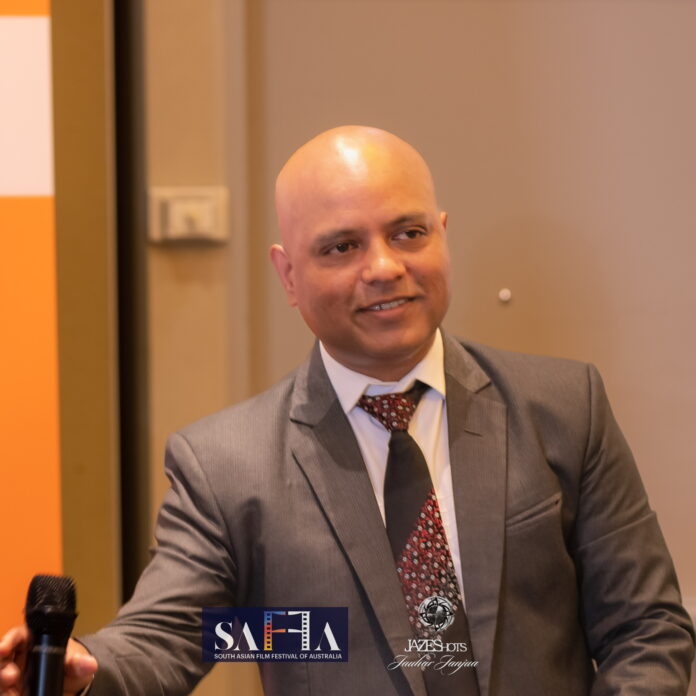The South Asian Film Festival of Australia (SAFFA) recently concluded its inaugural edition from March 17th to 19th in Sydney, leaving behind an impressive mark on the local film community. Festival co-directors and curators – Mr Vivek Asri and Dr Vikrant Kishore (who is also an Associate Professor at the University of Nottingham, China) are overwhelmed by the support they have received for the film festival and are keen to work on the next edition of the festival in 2024.
SAFFA was a grand celebration of South Asian film and culture, providing a platform for emerging and established filmmakers to showcase their work while engaging in networking opportunities. With over 2,000 films submitted and more than 500 attendees, the festival was a resounding success. SAFFA’s dedication to promoting cultural exchange between South Asia and Australia was evident throughout the three-day event, leaving a lasting impression on those in attendance.
We sat down for a short interview with Dr Vikrant Kishore, the co-director of SAFFA for his quick take on the highlights of SAFFA 2023.
Shveata Chandel: Vikrant, can you tell us about the inspiration behind creating the South Asian Film Festival of Australia?
Dr. Vikrant Kishore: The festival was created by a team of Australia-based filmmakers and film lovers, with the aim of highlighting South Asian talent within Australia and across the globe. There are hardly any film festival that gives any attention to the short and experimental films by South Asians in Australia, thus, this was our attempt to bridge the gap.
Shveata Chandel: How were the films selected for the festival?
Dr. Vikrant Kishore: The final selection of films was made by an eminent jury comprising actor-director Vipin Sharma, actor Arka Das, documentary filmmaker Emma Macey, and eminent cinematographer Arindam Bhattacharjee. We were able to create a bouquet of 25 films, including ten short fiction films and ten short documentaries, exploring important themes, and offering unique perspectives on the South Asian region. Additionally, the festival had a specially curated section on South Asian films made in Australia. This section aimed to highlight the contributions of South Asian filmmakers in Australia and bring their stories to the forefront. By doing so, the festival aims to encourage and support South Asian filmmakers in Australia and provide them with a platform to showcase their work.
Shveata Chandel: Can you tell us about the closing film of the festival?
Dr. Vikrant Kishore: The closing film was Rani Mukerji starrer Mrs Chatterjee vs Norway a Bollywood mainstream film, which was very well received. We had a house full session during the closing night… it was heartening to get such a wonderful response.
Shveata Chandel: What was the main goal of the festival?
Dr. Vikrant Kishore: The main goal of the festival was to promote independent filmmakers in the field of short and experimental films, while providing Australian audiences with an opportunity to engage with the diverse film cultures of South Asia and highlighting the stories of marginalized communities.
Shveata Chandel: How was the festival received by the community?
Dr. Vikrant Kishore: The festival was well-received by the community, with over 500 attendees and overwhelming support from the community and the esteemed jury members.
Shveata Chandel: Can you tell us about the SAFFA awards presented during the festival?
Dr. Vikrant Kishore: The Best Australian film award went to the documentary Helicopter Tjungarrayi, the Best Documentary Film award went to the film Aamir – A Trial for Life, and the Best Short Film award went to the film Birani. The full list of winners is on our website – www.saffa.sydney
Shveata Chandel: What message do you hope the festival sends to the film industry?
Dr. Vikrant Kishore: We hope to send a message that South Asian cinema has a vibrant and engaged audience in Australia, and that we remain committed to showcasing an increasing number of South Asian films to audiences in Australia.
Shveata Chandel: How do you plan on supporting and promoting diverse voices in cinema through future events and initiatives?
Dr. Vikrant Kishore: We plan on continuing to provide unique opportunities for filmmakers to showcase their work and engage in dialogue and networking through future events and initiatives. We will have ongoing events in online and offline mode, from film based talks, panel discussions, special film screenings, to networking sessions all are planned, and we hope to announce our plan soon.
Shveata Chandel: What do you hope the future holds for the South Asian Film Festival of Australia?
Dr. Vikrant Kishore: Answer: We hope to continue to grow and provide a platform for emerging and established filmmakers to exhibit their work while engaging in networking opportunities, and to further promote the appreciation of South Asian film and culture. Australia has become a vibrant space for South Asian cinema, with a growing interest in the unique stories, perspectives, and styles of the region. I see the South Asian Film Festival of Australia playing an important role in this by showcasing the latest films from South Asia and the diaspora.
The festival will not only serve as a platform for filmmakers to exhibit their work, but it will also provides networking opportunities and helps to foster a community of creatives.

